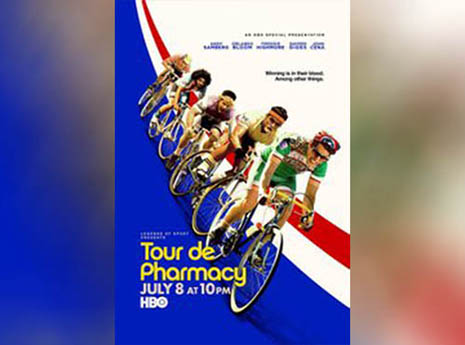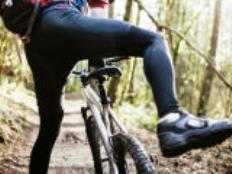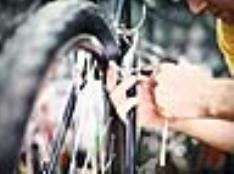Take, for example, road tire width. For years, it was thought that narrower is faster. It made sense: The less contact you have with the ground, the lower your rolling resistance, right? Except that real world tests tend to show that slightly wider tires (around 25mm) actually tend to be faster than their 22 or 23mm cousins. Still, I get advice from some seasoned cyclists that I should be running narrower tires maxed out at 120 PSI.
Looking back to when we ourselves were fledgling cyclists (and more recently, too), we've rounded up some of the least helpful tips for the road and the trail, along with why that advice isn't so great.
Read the original article on Bicycling.com.
"Put Your Weight Back When Descending"
1 of 6
Mountain bike technology and technique has evolved a lot since it first started gaining traction in the 80s and 90s. Back then, due to limitations on frame geometries, you did need to put your weight back (i.e. thrust your hips behind your saddle), especially on steep descents, in order to keep your center of gravity low. With modern full suspension steeds, it's actually better to stand up, center yourself over the bike, hinge at the hips, and use your glutes for support. You should feel stable and balanced. Case in point: Watch the stylings of downhill pros such as Rachel Atherton.
Find:
Your Next Ride"You Need to Lose Weight to Climb Faster"
2 of 6
One look at a Tour de France cyclist versus your average weekend warrior and you can't help but notice: Gosh darn, if those pros aren't skinny. Read almost any article on how to climb faster, and the most common piece of advice is to shed any unnecessary pounds to increase your power-to-weight ratio. However, that wisdom isn't helpful, or even safe, for all of us. "A lot of people told me I would do a lot better if I lost weight," says Giana Roberge, cycling coach and former professional cyclist with the Timex Women's Team. "The times I got skinny, I got very sick—like mono, couldn't-race-sick. Your heart and determination can overcome five 'extra' pounds (whoever's ideal that is)." If you do want to lose weight, be sure to consult your physician first to formulate a diet and training plan that works for you.
Find:
Your Next Ride"Riding Two by Two Is Illegal"
3 of 6
This is one you may not hear from fellow cyclists, but rather from helpful drivers "sharing" the road with their two-wheeled compatriots. In most states (39, to be exact), you are legally allowed to ride two abreast. However, the details do vary state by stateand municipality to municipality. It's a good idea to research what the law says where you live, or in places you'll be traveling. In Hawaii, for example, you should ride single file unless a bike lane is wide enough to accommodate double file riding. In general though, it's OK to ride two by two as long as you're not impeding traffic.
Find:
Your Next Ride"You Need to Pump Your Tires All the Way Up"
4 of 6
In our tips for cycling beginners, Judd Van Sickle, biomechanical engineer with the Sports Performance Program at UC Davis Sports Medicine, said that most people overinflate their tires on a road bike. "Especially with smaller riders, you'll get a 110-pound female with 120 psi on the tire," Van Sickle said. "They should be at like 75 psi." Not overinflating the tires makes the bike handle more consistently, makes it much more comfortable to ride, takes out the high-level vibrations, and helps the bike brake in corners better.
Find:
Your Next Ride"You Need the Right Gear to Win a Race"
5 of 6
"At my first race I was in running shoes, a huge hooded sweatshirt, and umbros—on a Serotta I'd borrowed from somebody," Roberge recalls. Someone told her, "You can't race that way!" She didn't just race that way: She won that way (and that race was the year's New York mountain bike state championship race!). People will try to tell you that you need to upgrade your wheels, buy a more aerodynamic bike, or any number of other things before you toe the line at your first race. The truth of the matter is that all you need to do is show up, let your legs prove your worth, and you'll learn (and buy) the rest on the way, as needed
Find:
Your Next RideAbout the Author







Discuss This Article